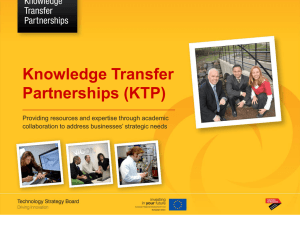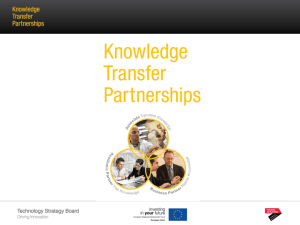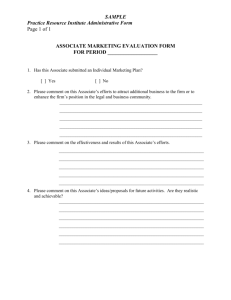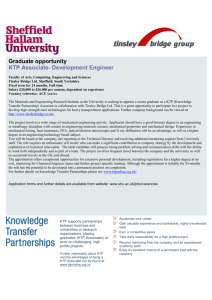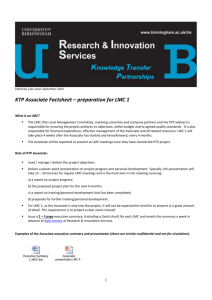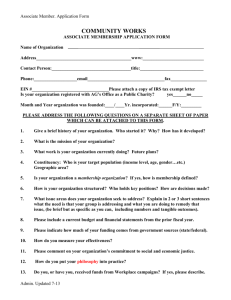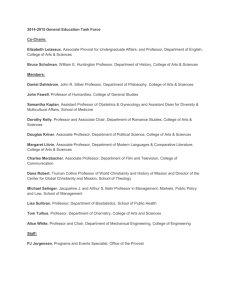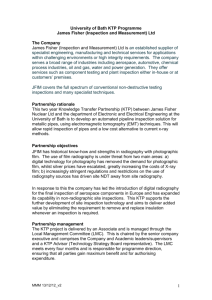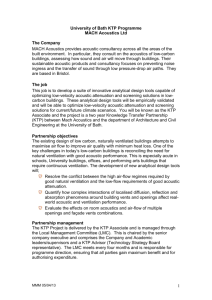Launch Meeting of TCS Programme 4372 between
advertisement
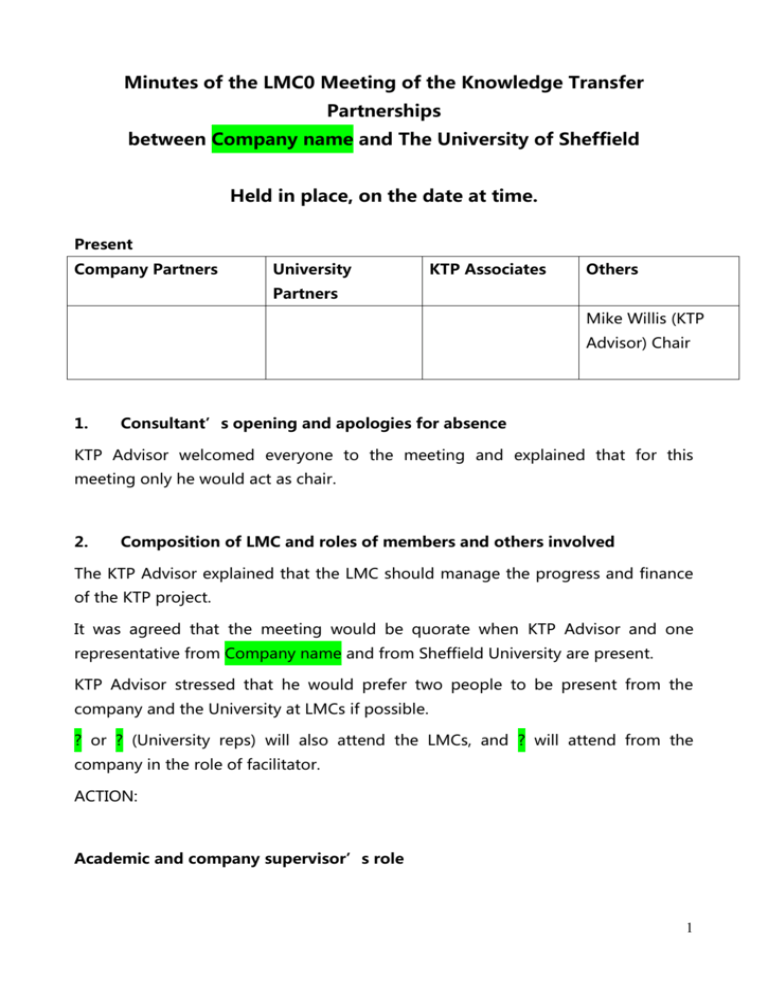
Minutes of the LMC0 Meeting of the Knowledge Transfer Partnerships between Company name and The University of Sheffield Held in place, on the date at time. Present Company Partners University KTP Associates Others Partners Mike Willis (KTP Advisor) Chair 1. Consultant’s opening and apologies for absence KTP Advisor welcomed everyone to the meeting and explained that for this meeting only he would act as chair. 2. Composition of LMC and roles of members and others involved The KTP Advisor explained that the LMC should manage the progress and finance of the KTP project. It was agreed that the meeting would be quorate when KTP Advisor and one representative from Company name and from Sheffield University are present. KTP Advisor stressed that he would prefer two people to be present from the company and the University at LMCs if possible. ? or ? (University reps) will also attend the LMCs, and ? will attend from the company in the role of facilitator. ACTION: Academic and company supervisor’s role 1 The academic supervisor should spend ½ day per week on the programme. KTP Advisor explained that this can be flexible, and after the first few months could be a day a fortnight instead. KTP Advisor reminded that as well as being a supervisor for this project ? is also a conduit to the University for the company. The technical team comprises the two supervisors and the Associate. KTP best practice recommends that the technical team have monthly meetings. As part of the Associate’s personal development they should chair these meetings and record action points. The supervisors should help to guide the KTP Associate’s personal development. The Associate will have to develop a personal development plan and a training plan. The supervisors should assist the Associate with this and agree any expenditure etc. KTP Advisor explained that regular communication with all 3 partners (academic, company and Associate) is key. This provides the company with regular opportunities to raise other issues and get maximum benefit from the project. At a standard LMC the following reports are presented: The Chair should give a verbal report on the state of the company. The company supervisor should report on how the project is progressing. The academic supervisor should give their perspective on the projects progress and also discuss relevant University benefits and relevant University activities. The facilitator’s report should include comments on the Gantt chart and comments on progress against timescales The Associate should circulate an executive summary of around 1-2 pages which outlines what they have done, problems encountered, future plans. They should be encouraged to put things in a commercial setting. The Associate is also asked to give a 10-15 minute presentation that covers the same issues. 3. Establish pattern of future LMC meetings 2 KTP Advisor explained that in future LMC meetings ? will act as chair. ? will act as secretary. This is a X year KTP so it should have Y LMCs. The minutes and the financial statements should be sent to Momenta; if the minutes are not received the University will not be paid. LMC 1 should be held around 6 weeks after the Associate starts. The meetings should then be held every 4 months. KTP Advisor asked if all parties could stick to a meeting date once it has been arranged. 4. Confirmation of programme objectives and programme Gantt chart KTP Advisor asked if ? and ? could carry out a risk assessment of the project; the Associate will be working to a structured plan and the supervisors should consider what will cause momentum to halt and how the problems could be overcome. ACTION: supervisors to conduct a risk assessment. KTP Advisor asked the team to share expectations about what will make the project a major success e.g. cultural change, papers published, placements etc 5. Associate recruitment and terms of contract The type of Associate was discussed. The ideal candidate may not be someone with the best academic qualifications but someone who possesses the right combination of technical knowledge, communication skills, management skills and confidence. The team should consider work permit issues if recruiting a non-EU Associate. Progress on job spec ACTION: The Associate is recruited off-scale on the salary that the LMC decide and there are no automatic pay increases. The LMC decides when the Associate gets a salary increase or bonus. The Associate is recruited on 6 month probation; if there is a problem with the Associate then it is possible to re-recruit. 3 ACTION: ? to forward standard terms and conditions of employment. The team should shortlist and interview jointly. It is best to hold the interviews at the company. Second interviews? Associate’s management and development During the KTP the Associate will attend 3 week long residential courses. The University will give the Associate the option of taking up a higher degree. KTP Advisor encouraged ? to register the Associate on the degree (if appropriate) as soon as possible. The Associate will be required to prepare and Associate development plan as part of one of the modules. The KTP Associate is encouraged to become a member of a relevant professional institution. As part of the KTP programme the Associate will work towards diploma in management. 6. Plan associate induction and appraisal arrangements The Associate should have an appraisal after x months and also around x months before the end of the KTP project. This should be handled jointly by the two supervisors. The project has difficult issues and the Associate will need support. The correct choice of Associate is important too. Having a quick win early on in the project can help with the project success because the Associate feels a sense of achievement and company start to see the benefit of the Associate. Integration of the Associate is important because they aren’t part of the company staff. The University will register the KTP Associate on the KTP website. The Associate should then complete module 1 in the first 2-3 weeks. 7. Agree possible mini-projects for induction course Modules 2 and 3 should be completed within the first 2 – 3 months of the programme. In the time between modules 2 and 3 the Associate should complete 4 a mini project. This project should be 1 week in length and can be of any topic. The topic of the mini project should be agreed by both supervisors. The Associate will have to give a 15 minute presentation on the project at module 3. 8. Review financial control arrangements and agree invoicing procedure for recovery of industrial contribution costs An example of the standard financial statement was tabled. KTP Advisor explained how to read it. The spend since the last LMC has to be agreed and recorded at each meeting. Future spending should also be recorded in the minutes. Expenditure up to £500 can be agreed by the supervisors. Expenditure above £500 has to be agreed by the full LMC either at an LMC meeting or via circulated emails. It is possible to vary between the budget headings towards the end of the project. X discussed possible methods for the company to pay – either an invoice after each LMC, or a regular monthly payment. X will discuss this and inform the University. X explained that if the company makes purchases for the project they should invoice the University for the full amount. They can do this either as individual items or every few months when the amounts have reached a significant value. The University should be able to claim back VAT provided the item purchased is solely for use on the project and is not to be used for teaching. 9. Agree any requisite financial expenditure The Associate will need a computer and it was agreed that the team would spend up to £X on a laptop for the Associate. KTP Advisor encouraged the team to look into insuring the laptop. He reminded the team that software should be bought on an academic license. 10. Confirm IPR agreement as appropriate The IP agreement is between the company and the University. The agreement is under negotiation and the company should discuss it with Research & Innovation 5 Services. The company can ask that the Associate signs an NDA if they think it is appropriate. 11. Attendance at Supervisors’ workshop KTP Advisor reminded the supervisors that they must attend the supervisor’s workshop together. The university will not get paid if they do not attend the workshop. The supervisors should take a copy of the proposal with them to the workshop. The supervisors plan to attend a workshop in PLACE on DATE if possible. ACTION: Supervisors to attend supervisor’s workshop. 12. Any other business 13. Date of the next meeting To be arranged after the KTP Associate is recruited. Action list 6
